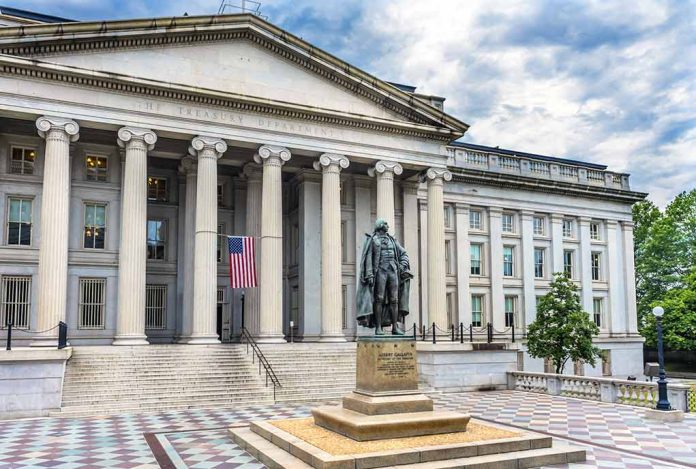
A federal judge has blocked Elon Musk’s Department of Government Efficiency from accessing sensitive Treasury Department records, igniting a fierce debate over privacy and government transparency.
Key Takeaways
- Federal court blocks Musk’s Department of Government Efficiency (DOGE) from accessing Treasury data
- Lawsuit filed by 19 Democratic attorneys general alleges illegal access to sensitive information
- Judge orders destruction of downloaded data and sets hearing for February 14
- Critics warn of potential misuse of personal and financial information
- Treasury Department claims review is for system integrity assessment only
Federal Judge Halts DOGE’s Access to Treasury Records
In a significant legal development, a federal judge has issued an injunction preventing Elon Musk’s Department of Government Efficiency (DOGE) from accessing sensitive records held by the U.S. Treasury Department. The ruling comes in response to a lawsuit filed by 19 Democratic attorneys general against President Trump’s administration, alleging unauthorized access to the Treasury’s central payment system.
The central payment system in question is responsible for managing tax refunds, Social Security payments, veterans’ benefits, and other critical financial transactions. It contains extensive personal and financial data for millions of American citizens. Judge Paul A. Engelmayer, who issued the ruling, has ordered the destruction of any sensitive information that may have been downloaded and scheduled a hearing for February 14 to address the matter further.
Huge blow to Elon Musk as a federal judge has blocked him and his team from accessing Treasury Department data.
This decision was made in response to a lawsuit filed by 19 Democratic state attorneys-general. The judge issued a temporary order restricting Musk's Department of… pic.twitter.com/tDiyS40PA9
— The Global 202 (@theglobal202) February 8, 2025
DOGE’s Mission and Controversy
DOGE was established with the stated purpose of identifying and eliminating wasteful government spending. However, its attempt to access Treasury records has raised significant security and privacy concerns. Critics argue that DOGE’s access could potentially lead to an illegal freeze of federal funds and unauthorized blocking of essential payments to citizens who rely on government assistance.
“This unelected group, led by the world’s richest man, is not authorized to have this information, and they explicitly sought this unauthorized access to illegally block payments that millions of Americans rely on, payments for health care, child care and other essential programs” stated New York Attorney General Letitia James. The lawsuit claims that DOGE’s access violates federal law, administrative law, and the U.S. Constitution’s separation of powers. Treasury Secretary Scott Bessent stands accused of altering policies to allow DOGE access to this sensitive information, further complicating the legal and ethical implications of the situation.
Potential Implications and Reactions
The gravity of this situation has not been lost on state officials. Connecticut Attorney General William Tong has gone so far as to label this incident “the largest data breach in American history,” underscoring the potential scale and impact of the unauthorized access.
In response to the mounting criticism, the Treasury Department has maintained that the review was intended solely to assess system integrity, with no changes being made to the data or systems. However, this explanation has done little to quell the concerns of privacy advocates and lawmakers who fear the potential misuse of such sensitive information.
Democratic lawmakers and advocacy groups are calling for further investigation and legal action against DOGE’s attempted access. The outcome of this case could have far-reaching implications for government transparency, data privacy, and the balance of power between different branches of government in the digital age.
Sources:
Federal judge blocks Musk’s DOGE from accessing sensitive U.S. Treasury Department material



